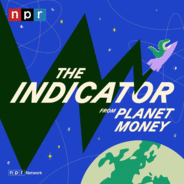President Donald Trump has said that Canada should be the 51st state... and Canadians? Well, they're furious about it. The nation's former finance minister is calling Trump the biggest threat Canada has faced since World War 2. So today on the show, we dig into what lessons Canada can teach the US, and how the two North American nations are already deeply intertwined. Related episodes:Add to cart: Greenland (Apple / Spotify)Canada's key resource against Trump's potential trade war (Apple / Spotify)For sponsor-free episodes of The Indicator from Planet Money, subscribe to Planet Money+ via Apple Podcasts or at plus.npr.org.Fact-checking by Sierra Juarez. Music by Drop Electric. Find us: TikTok, Instagram, Facebook, Newsletter. Learn more about sponsor message choices: podcastchoices.com/adchoicesNPR Privacy Policy

Wirtschaft
The Indicator from Planet Money Folgen
A bite-sized show about big ideas. From the people who make Planet Money, The Indicator helps you make sense of what's happening in today's economy. It's a quick hit of insight into money, work, and business. Monday through Friday, in 10 minutes or less.
Folgen von The Indicator from Planet Money
300 Folgen
-
Folge vom 26.02.2025A polite message from Canada to the U.S.
-
Folge vom 25.02.2025What's the long-term cost of federal layoffs?The personal story of how an energetic lawyer got knocked off from her dream career and what she thinks that might mean for whether the government can attract talented people in the future.Related Episodes: A 'Fork in the Road' for federal employees (Apple / Spotify)Bailing out the FAIR plan, broligarchs beef, and CFPB RIP? (Apple / Spotify)For sponsor-free episodes of The Indicator from Planet Money, subscribe to Planet Money+ via Apple Podcasts or at plus.npr.org. Fact-checking by Sierra Juarez. Music by Drop Electric. Find us: TikTok, Instagram, Facebook, Newsletter.Learn more about sponsor message choices: podcastchoices.com/adchoicesNPR Privacy Policy
-
Folge vom 24.02.2025What if our income was taxed ... totally differently?We are back to answer YOUR listener questions. This time, we answer why bananas can be considered the 'unbothered fruit', what a flat income tax would actually look like, and how extended-hours stock trading works. If you have your own question about the economy, please email us at indicator@npr.org. Related episodes: My Favorite Tax Loophole (Apple / Spotify) The cautionary tale of a recovering day trading addict (Apple / Spotify) So imPORTant: Bananas, frogs, and... Bob's?? (Apple / Spotify) For sponsor-free episodes of The Indicator from Planet Money, subscribe to Planet Money+ via Apple Podcasts or at plus.npr.org. Fact-checking by Sierra Juarez. Music by Drop Electric. Find us: TikTok, Instagram, Facebook, Newsletter. Learn more about sponsor message choices: podcastchoices.com/adchoicesNPR Privacy Policy
-
Folge vom 21.02.2025Chicken meat, Gulf of Mexico lawsuit and Social Security beyond the graveSurprisingly stable chicken meat prices, a lawsuit threat against the Gulf of Mexico's name change, and the Trump administration's false claims about Social Security beyond the grave are all under the microscope on this edition of Indicators of the Week. Related episodes: What the cluck is happening with egg prices? What does the next era of Social Security look like? The fight for a legendary shipwreck's treasureFor sponsor-free episodes of The Indicator from Planet Money, subscribe to Planet Money+ via Apple Podcasts or at plus.npr.org. Fact-checking by Sierra Juarez. Music by Drop Electric. Find us: TikTok, Instagram, Facebook, Newsletter. Learn more about sponsor message choices: podcastchoices.com/adchoicesNPR Privacy Policy
